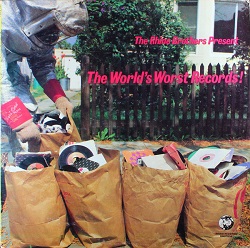The Atrocious Music Collection: #36 in a series
Artists: Wild Man Fischer, Edith Massey, & Gloria Balsam
Song Titles: Various
Category: Unique VoicesYear: early 1980s?
Cover art style: N/A
Audio:
Acquisition: Recorded from the album The Rhino Brothers Present The World's Worst Records! ca. 1984
There is a cassette tape in the Collection that rests cradled in a special cassette case which has a bold yellow paper insert. Well, it was bold yellow at one time, but it appears time has faded it somewhat, and unevenly as different parts of it were exposed to different amounts of light. But nevertheless, the Yellow Tape (as it is known) remains uniquely visible in the Collection, even from a distance, because of this distinctive wrapping. And there is a reason for that – there is something on this tape that is not to be trifled with, that once heard, cannot be unheard. And we will get to that in another post. Soon.
But there are less dangerous parts of the Yellow Tape, and that is what this post is about. It became a repository of many bits and pieces found in the early days of the Collection, some of which have been covered in previous posts, such as Hervé Villechaize’s Why. I mention all of this because the three songs below are on this tape, somehow finding their way there from the now lost disc, The Rhino Brothers Present The World's Worst Records!
Released in 1983, the disc contained some people and tracks previously discussed, such as the Legendary Stardust Cowboy’s Paralyzed, a Barnes and Barnes number (see their appearance on the Dr. Demento album), and Rhino Records regulars, the Temple City Kazoo Orchestra.
What also links the three songs discussed below are singing styles that are wildly atypical, outside the norms of all vocal instruction known to singer, vocologist, musicologist, or anthropologist. If nothing else, we must salute the individuality these vocalist express through their instrument.
One of the three preserved tracks is by Wild Man Fischer, whose My Name is Larry is mentioned elsewhere. His cover of Young at Heart challenges the very notion of what a song is. If this is the same thing as (for example) the song Sinatra sings and calls Young at Heart, how we can we trust the ground we walk on? I know, the words are the same, almost. The rhythms and pitches are not too far off at times. But if there is a Platoian ideal of Young at Heart that all renditions of Young at Heat are mere shadows of, the light that casts this shadow of Young at Hearthas passed through a cracked prism and then bounced off a fun-house mirror or two.
The second song is also a cover, Edith Massey’s more literal take on Big Girls Don’t Cry. Massey’s notoriety seems to rest solely on being the Egg Lady in John Waters’ low-class masterpiece Pink Flamingos (and some other rolls in movies made by the King of Camp). From a purely objective standpoint, it seems more appropriate for Massey to sing this song (and sing it the way she does) than for the Four Seasons (all men, after all) to sing it (and to sing it the way Frankie Valli does). It is a reinterpretation that forces us to frankly consider the lyrics and the message they carry. In that context, I salute Massey’s rendition of Big Girls. That doesn’t mean I want to listen to it too often, however, but then again, I'm not a big fan of the Four Seasons' version either.
Lastly, an original. There are many songs about dogs, some of which are of the novelty variety. I'm not talking about How Much is that Doggie in the Window? I'm talking about stuff like Dead Puppy’s Aren’t Much Fun and I’m Looking Over My Dead Dog Rover from ye olde Dr. Demento episodes. But those are merely meant to get a laugh, with a bit of a shock at the idea of laughing about dead dogs. They sit firmly at the sophomoric humor level.
Rather, give me Gloria Balsam’s Fluffy any day. An ode to both a dog and the art of being “pitchy,” Balsam’s ability to be anywhere but on the right note meshes wonderfully with both the sentimental subject matter and that incredibly soaring note in the chorus. Her technique fully conveys the emotional longing of the song, along with the childlike nature of the singer's plea. As for that moment in the chorus... there are soaring operatic arias, show tunes that belt so much their belting sections have belting sections, and pop singers who can hit high note after high note live in concert, to our amazement… but in all of music history there’s nothing quite like that moment in Fluffy when Balsam sings “where AAARRRRREEE you!"
And that’s as it should be.

